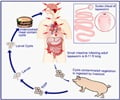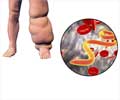A tiny protein vital in transporting essential ingredient in worms and other animals, including humans, a new study has found

The study findings also suggest a strategy for the development of drugs aimed at parasitic worms, which affect more than a quarter of the world's human population.
Like C. elegans, parasitic helminths such as hookworms don't produce any of their own heme. This means they are crucially dependent on heme from external sources and on the newly discovered transport pathway.
When this pathway doesn't function properly, they are unable to produce live offspring.
Researchers have found that a tiny protein called HRG-3 takes the heme from the intestine to other parts of the worms' body - their brains and skin, for example and perhaps most importantly, to their many embryos.
In the absence of HRG-3, heme accumulates in the intestine of pregnant mothers. Consequently, their embryos become heme deficient and either die or stop growing immediately after hatching.
Advertisement
Source-ANI










